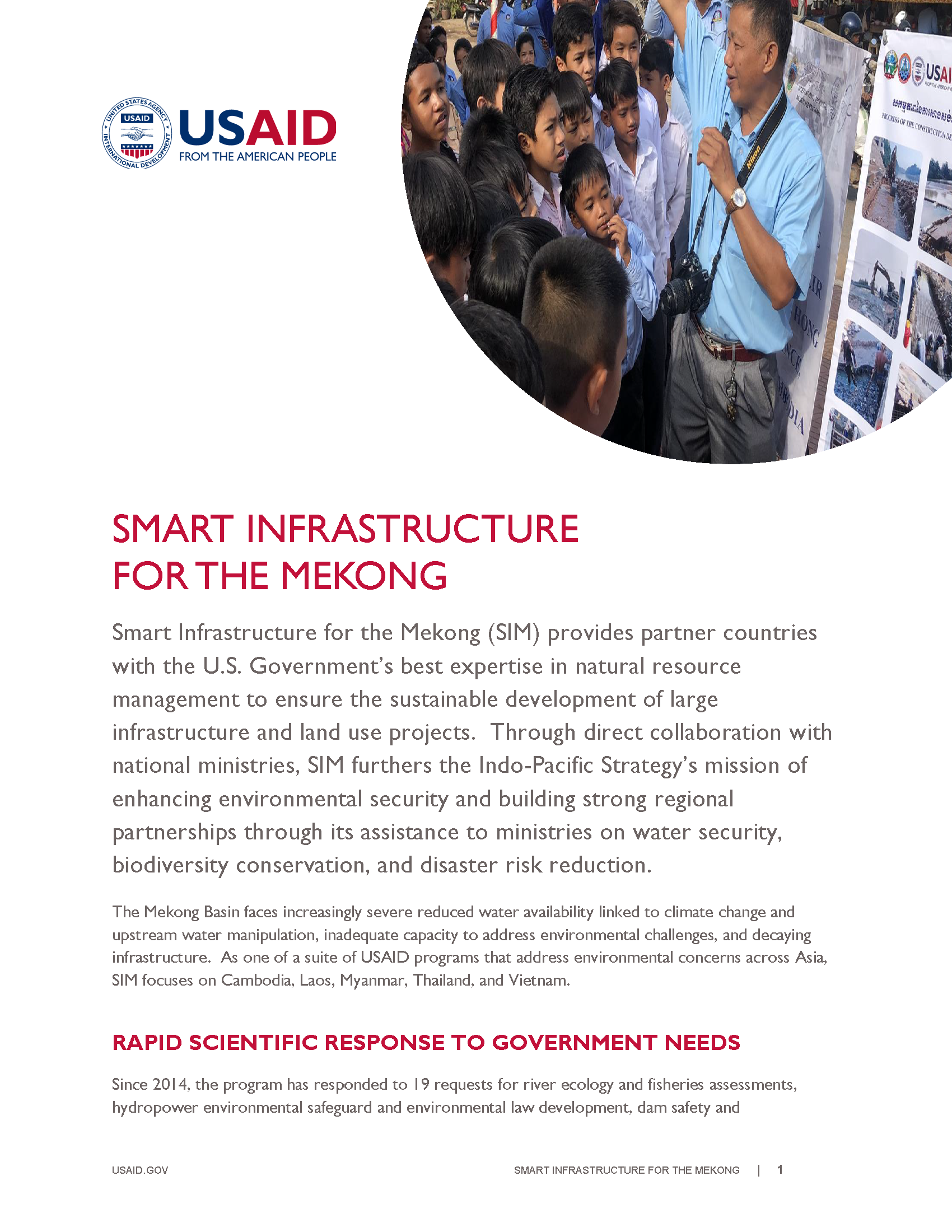Speeches Shim
Smart Infrastructure for the Mekong (SIM) ![]() (pdf - 384k)
(pdf - 384k)
Smart Infrastructure for the Mekong (SIM) provides partner countries with the U.S. Government’s best expertise in natural resource management to ensure the sustainable development of large infrastructure and land use projects. Through direct collaboration with national ministries, SIM furthers the Indo-Pacific Strategy’s mission of enhancing environmental security and building strong regional partnerships through its assistance to ministries on water security, biodiversity conservation, and disaster risk reduction.
The Mekong Basin faces increasingly severe reduced water availability linked to climate change and upstream water manipulation, inadequate capacity to address environmental challenges, and decaying infrastructure. As one of a suite of USAID programs that address environmental concerns across Asia, SIM focuses on Cambodia, Laos, Myanmar, Thailand, and Vietnam.
RAPID SCIENCETIFIC RESPONSE TO GOVERNMENT NEEDS
Since 2014, the program has responded to 19 requests for river ecology and fisheries assessments, hydropower environmental safeguard and environmental law development, dam safety and sedimentation assessment, and hydrological training. SIM responses include 77 missions by experts from the U.S. Department of Interior and sister departments, conducting workshops and field-based training, assessing agency programs, regulations, and statutes, providing U.S.-based advanced training, and seconding senior experts within ministries.
FISH RESTORATION FOR FOOD SECURITY
Fish populations are in decline across the Mekong Basin, in large part due to construction of dozens of hydropower dams and thousands of irrigation weirs, impacting more than 60 million people. These structures block migratory species from moving to historic spawning areas and dry season refuges. Recently constructed fishways under SIM now allow millions of fish to move through barriers, increasing the abundance of fish for communities upstream.
MAINTAINING RIVER HEALTH
The same structures that impound fish also change river characteristics, including the timing and volume of downstream water flows, and the transfer of sediments essential to fisheries and agriculture. SIM has conducted trainings on river discharge measurement, flood frequency estimation, and data analysis and management. Other teams addressed sedimentation processes and reservoir design, construction, and operation to maximize reservoir operational life and ensure adequate downstream sediment transfer.
DAM SAFETY UNDER A CHANGING CLIMATE
Thousands of irrigation dams in the Lower Mekong Basin are at or beyond their functional, safe lifespan. SIM teams have conducted 11 missions to Laos and Vietnam to assess safety conditions and safety programs at hydropower and irrigation dams and to build Ministry capacity in assessing dam failure risk and conducting recurrent safety inspections. SIM has trained more than 100 dam operators in Laos, and more than 500 officials in 20 of Vietnam’s 58 provinces.
IMPACTS AND RESULTS
In 2019, construction of the first fishway in Cambodia’s Tonle Sap Watershed allowed millions of fish of 106 species to ascend the river for spawning and rearing, increasing local food security. SIM’s 2018 to 2019 collaboration with the Cambodia Ministry of Environment contributed to the Ministry’s new Environmental Code, a compilation of the nation’s entire suite of environmental laws, was based on international best practices and robust science. From 2014 to 2015, SIM fielded multiple expert teams to assist in drafting and reviewing the Government of Vietnam’s Mekong Delta Study, the first comprehensive assessment of the impacts of mainstem dams on the Mekong River.


Comment
Make a general inquiry or suggest an improvement.